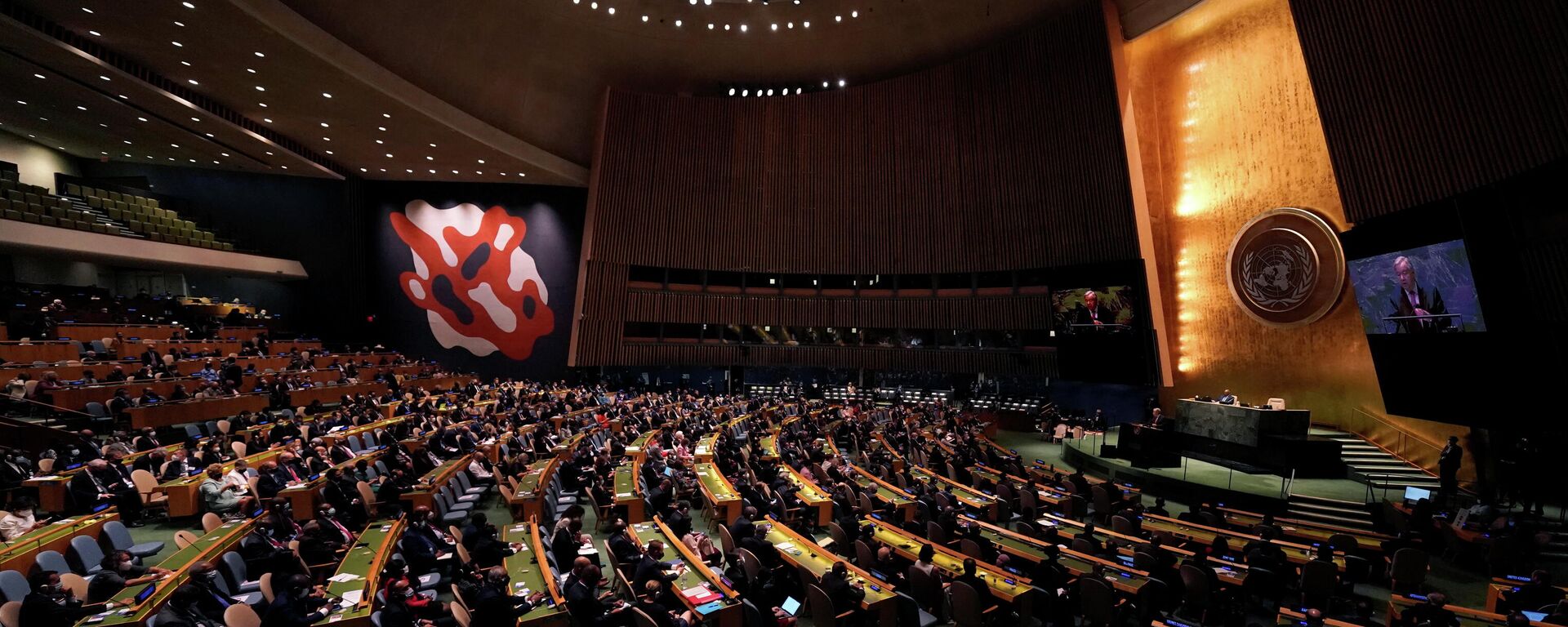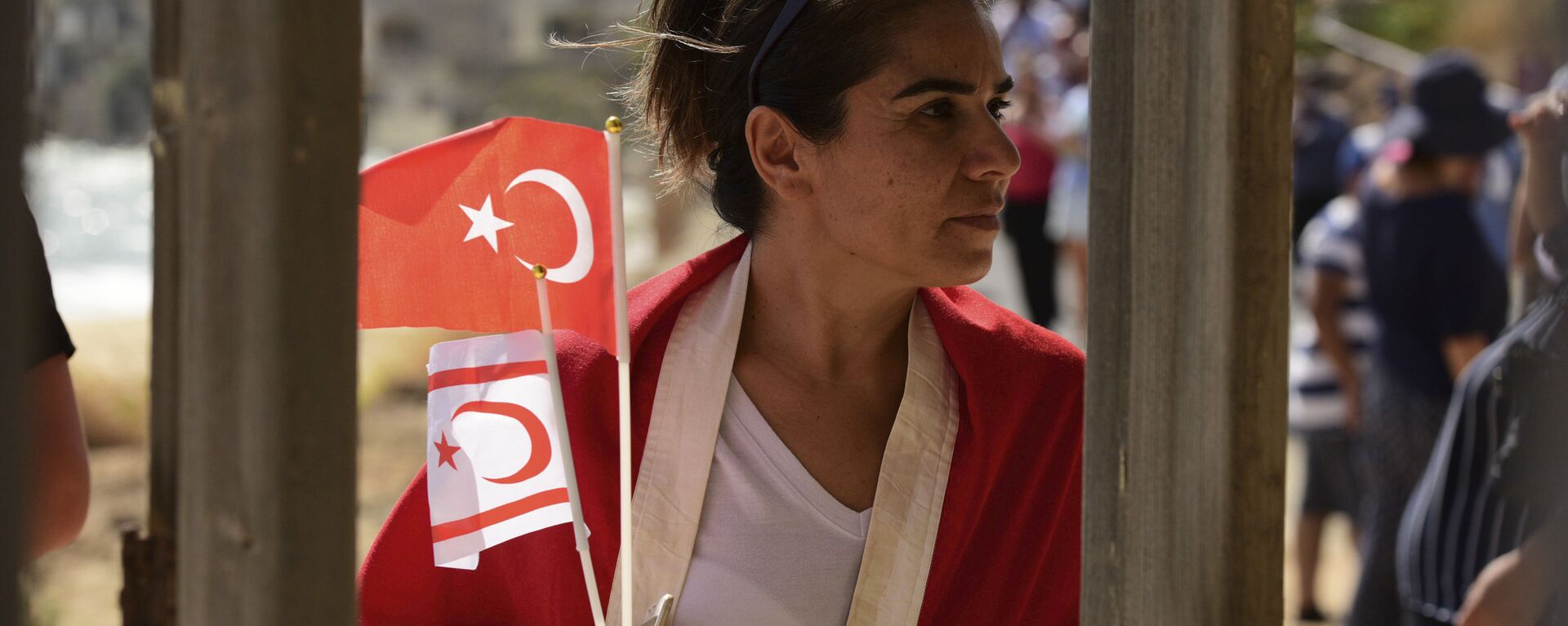https://sputnikglobe.com/20210927/turkish-cypriot-president-says-un-recognition-of-northern-cyprus-not-there-yet-unrealistic-now-1089449283.html
Turkish Cypriot President Says UN Recognition of Northern Cyprus 'Not There Yet,' Unrealistic Now
Turkish Cypriot President Says UN Recognition of Northern Cyprus 'Not There Yet,' Unrealistic Now
Sputnik International
WASHINGTON (Sputnik) - Northern Cyprus does not expect to receive a full UN recognition at the moment because it is not realistic and "the situation is not... 27.09.2021, Sputnik International
2021-09-27T13:23+0000
2021-09-27T13:23+0000
2022-10-19T20:11+0000
north cyprus
world
the united nations (un)
https://cdn1.img.sputnikglobe.com/img/07e4/0a/0a/1080729105_0:161:3069:1887_1920x0_80_0_0_6fb9f5b9b183fc4f39173cb0c8dad0d3.jpg
"That’s not realistic. I cannot expect that now because the situation is not there yet," Tatar said. "What I want is the sovereign equality. I want this to be acknowledged. If it is not acknowledged, then we are prepared to sit at the negotiating table to formally discuss the Cyprus topic. I don’t expect recognition tomorrow, that’s not realistic. I wish that they recognize us because we are a fully-fledged state."Tatar says that Northern Cyprus is prepared to formally negotiate the Cyprus issue when its sovereign equality and equal international status are recognized, and believes that the UN chief should propose that to the United Nations Security Council.Tatar adds that they insist that such a settlement should be based on two cooperating independent states living side by side."It is impossible to reunite. It is impossible for the two peoples to merge because we have been separated the last 60 years. We don't know them, they don't know us. We speak Turkish, they speak Greek. We are Muslims, they are Christians. Different culture, everything is different. How can you reunite? It’s impossible. The reality on the island is that we have two different states, we should reconcile and the two states should cooperate."Tatar stresses that the Cyprus problem was both long-standing and complex, as it involved not only Turkish Cypriot people but also the regional stability.According to Tatar, North Cyprus is willing to cooperate with the Republic of Cyprus, for example to share the government and resources, however, it insists that the Turkish military should remain on the island.Cyprus, populated by Greek and Turkish Cypriots, has been a stumbling block for Turkey and Greece for almost half a century. The island was de facto divided in 1974, when Turkey deployed armed forces to Cyprus after an attempt to unify Cyprus with Greece. In 1983, the self-proclaimed Turkish Republic of Northern Cyprus was formed, recognized solely by Turkey.Negotiations on the reunification of Cyprus have been conducted almost from the moment of its division. The United Nations has attempted brokering reunification talks, but the negotiation has reached an impasse."The international community should always remember that Turkey is a side," he notes. "Cyprus problem is not only between Turkish and Greek Cypriots, it does also involve Turkey because Turkey is a guarantor power and we have a lot of relationship with Turkey. Turkey has saved us from great massacre… The Turkish Cypriots suffered a lot, we were going through genocide twice, a lot of people have been buried, some alive, [including] children."At the same time, President Tatar points out that there's no need for UN peacekeepers in Cyprus."We definitely want Turkish guarantee. We definitely want some Turkish troops on the island for our security because that’s the only way we will secure on the island. Otherwise, we will be exposed to risks and other terrorist activities."In July, the self-proclaimed Turkish Republic of Northern Cyprus, backed by Ankara, unilaterally demilitarized the UN-protected quarter of Varosha, a town in the buffer zone that separates the Greek and Turkish communities on the island. The UN Security Council condemned the move, saying it violates all previous United Nations resolutions on Cyprus.The UN mission on Cyprus, UNFICYP, was established in 1964 to prevent the escalation of violence between the Greek Cypriots and Turkish Cypriots. On January 30, the United Nations Security Council (UNSC) adopted a resolution extending the mandate of the peacekeeping force by another six months. The UNSC decision was criticized by Turkey as not making tangible contribution to the efforts toward the settlement of the Cyprus issue.
https://sputnikglobe.com/20210924/n-cyprus-to-convey-at-un-talks-its-desire-for-sovereign-equality---president-1089385664.html
https://sputnikglobe.com/20210918/turkish-foreign-ministry-condemns-decision-of-southern-european-states-on-cyprus-1089184426.html
north cyprus
Sputnik International
feedback@sputniknews.com
+74956456601
MIA „Rossiya Segodnya“
2021
Sputnik International
feedback@sputniknews.com
+74956456601
MIA „Rossiya Segodnya“
News
en_EN
Sputnik International
feedback@sputniknews.com
+74956456601
MIA „Rossiya Segodnya“
Sputnik International
feedback@sputniknews.com
+74956456601
MIA „Rossiya Segodnya“
north cyprus, the united nations (un)
north cyprus, the united nations (un)
Turkish Cypriot President Says UN Recognition of Northern Cyprus 'Not There Yet,' Unrealistic Now
13:23 GMT 27.09.2021 (Updated: 20:11 GMT 19.10.2022) WASHINGTON (Sputnik) - Northern Cyprus does not expect to receive a full UN recognition at the moment because it is not realistic and "the situation is not there yet," Turkish Cypriot President Ersin Tatar told Sputnik.
"That’s not realistic. I cannot expect that now because the situation is not there yet," Tatar said. "What I want is the sovereign equality. I want this to be acknowledged. If it is not acknowledged, then we are prepared to sit at the negotiating table to formally discuss the Cyprus topic. I don’t expect recognition tomorrow, that’s not realistic. I wish that they recognize us because we are a fully-fledged state."
Tatar says that Northern Cyprus is prepared to formally negotiate the Cyprus issue when its sovereign equality and equal international status are recognized, and believes that the UN chief should propose that to the United Nations Security Council.
"All we want is sovereign equality and equal international status. This is not very much. The secretary-general should propose this to the UN Security Council. They should acknowledge, they should reaffirm our sovereignty because we are sovereign," Tatar says"Therefore, we are claiming our sovereign equality. I am not saying that tomorrow they should recognize my state, that is to come later in time. But now all I am asking is for my sovereign equality and equal international status to be acknowledged. If these are acknowledged, if these are accepted, reaffirmed, then we will sit at the negotiating table formally to discuss a comprehensive settlement for Cyprus problem."
Tatar adds that they insist that such a settlement should be based on two cooperating independent states living side by side.
"It is impossible to reunite. It is impossible for the two peoples to merge because we have been separated the last 60 years. We don't know them, they don't know us. We speak Turkish, they speak Greek. We are Muslims, they are Christians. Different culture, everything is different. How can you reunite? It’s impossible. The reality on the island is that we have two different states, we should reconcile and the two states should cooperate."
Tatar stresses that the Cyprus problem was both long-standing and complex, as it involved not only Turkish Cypriot people but also the regional stability.

24 September 2021, 22:15 GMT
According to Tatar, North Cyprus is willing to cooperate with the Republic of Cyprus, for example to share the government and resources, however, it insists that the Turkish military should remain on the island.
"We are prepared to cooperate but we would like the Turkish currency to continue," he explains. "We would like some Turkish troops to remain on the island for our security because we know in the past that if Turkish troops completely withdraw we are at the mercy exposed to Greek Cypriots attacks and other movements which would want to have the island again."
Cyprus, populated by Greek and Turkish Cypriots, has been a stumbling block for Turkey and Greece for almost half a century. The island was de facto divided in 1974, when Turkey deployed armed forces to Cyprus after an attempt to unify Cyprus with Greece. In 1983, the self-proclaimed Turkish Republic of Northern Cyprus was formed, recognized solely by Turkey.
Negotiations on the reunification of Cyprus have been conducted almost from the moment of its division. The United Nations has attempted brokering reunification talks, but the negotiation has reached an impasse.
"The international community should always remember that Turkey is a side," he notes. "Cyprus problem is not only between Turkish and Greek Cypriots, it does also involve Turkey because Turkey is a guarantor power and we have a lot of relationship with Turkey. Turkey has saved us from great massacre… The Turkish Cypriots suffered a lot, we were going through genocide twice, a lot of people have been buried, some alive, [including] children."

18 September 2021, 10:23 GMT
At the same time, President Tatar points out that there's no need for UN peacekeepers in Cyprus.
"We definitely want Turkish guarantee. We definitely want some Turkish troops on the island for our security because that’s the only way we will secure on the island. Otherwise, we will be exposed to risks and other terrorist activities."
In July, the self-proclaimed
Turkish Republic of Northern Cyprus, backed by Ankara, unilaterally demilitarized the UN-protected quarter of Varosha, a town in the buffer zone that separates the Greek and Turkish communities on the island. The UN Security Council condemned the move, saying it violates all previous United Nations resolutions on Cyprus.
The UN mission on Cyprus, UNFICYP, was established in 1964 to prevent the escalation of violence between the Greek Cypriots and Turkish Cypriots. On January 30, the United Nations Security Council (UNSC) adopted a resolution extending the mandate of the peacekeeping force by another six months. The UNSC decision was criticized by Turkey as not making tangible contribution to the efforts toward the settlement of the Cyprus issue.




